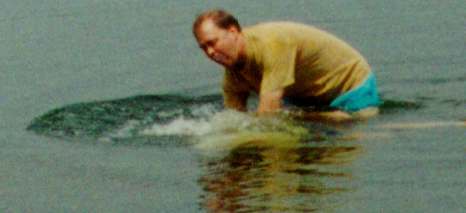
Roman Catholic Faith Examined!
Catholic false teaching on Baptism:
![]() Immersion Versus Pouring
Immersion Versus Pouring
![]() Infant Baptism is Catholic but Un-biblical
Infant Baptism is Catholic but Un-biblical
Not even John Paul II can make right, an infant baptism by sprinkling, that is wrong according to the Bible!

Infant Baptism is Catholic but Un-biblical
|
|
Roman Catholic Faith Examined! Catholic false teaching on Baptism:
|
|
Not even John Paul II can make right, an infant baptism by sprinkling, that is wrong according to the Bible! |
|
![]()
We Speak truth in LOVE
tell us if we have misrepresented Catholic Faith
![]()
The book, My Catholic Faith, on page 270 gives the present day practice of the Catholic Church on baptism. It says, "How would you give baptism? I would give baptism by pouring ordinary water on the forehead of the person to be baptized..."
The Bible clearly teaches that baptism is a burial in water, not a pouring of water. Our English word "baptism" is from the Greek word "baptisma" and means "immersion, submersion and emergence" (Vine's Expository Dictionary of New Testament Words, p. 96), "to dip, immerse, submerge" (Thayer's Greek-English Lexicon, p. 94).

Consider the act of baptism as suggested by the baptism of Jesus. Mark writes, "In those days Jesus came from Nazareth of Galilee and was baptized by John in the Jordan. And when he came up out of the water, immediately he saw the heavens opened and the Spirit descending upon him like a dove." (Mark 1:9-10). Furthermore, examine the manner in which the eunuch of Ethiopia was baptized. "And he commanded the chariot to stop, and they both went down into the water, Philip and the eunuch, and he baptized him. And when they came up out of the water, the Spirit of the Lord caught up Philip; and the eunuch saw him no more and went on his way rejoicing." (Acts 8:38-39).
The apostle Paul said, "And you were buried with him in baptism, in which you were also raised with him through faith in the working of God, who raised him from the dead." (Col. 2:12). In Rom. 6:4, Paul said, "We were buried therefore with him by baptism into death, so that as Christ was raised from the dead by the glory of the Father, we too might walk in newness of life." Consequently, it is abundantly clear that the baptism which God ordained is a burial or immersion in water.
The Following Catholic officials freely admit that immersion was the common practice for many years.
"Baptism took place by immersion in ancient times." (New Interpretation of the Mass, p. 120).
"Catholics admit that immersion brings out more fully the meaning of the sacrament, and that for twelve centuries it was the common practice." (Question Box, p. 240).
"Baptism used to be given by placing the person to be baptized completely in the water: it was done in this way in the Catholic Church for 1200 years." (Adult Catechism, pp. 56-57).
"The church at one time practiced immersion. This was up to the thirteenth century. The Council of Ravenna, in 1311, changed the form from immersion to pouring." (Our Faith and the Facts, p. 399).
We raise a simple question here, "Who gave the Catholic Church the authority to change what the Lord ordained?" We are taught in God's holy word that we must follow the laws of the Lord without change or variation (Gal. 1:6-9; Rev. 22:18-19). When we follow the traditions and doctrines of men, our religion becomes vain (Matt. 15:9; Col. 2:8; Titus 1:13-14). The Bible plainly reveals that there would come a great "falling away" (2 Thess. 2:1-12) or "departing from the faith" (1 Tim. 4:1-5). In the last day many sincere religious people will be rejected because they have worked iniquity or acted without law (Matt. 7:22-23).
Consider the ridiculousness of the following "official" claims:
"Has the Catholic Church ever changed its teaching? No, for 2000 years the Church has taught the same things which Jesus taught." (Catholic Catechism for Adults, p. 57).
"It is a historical fact the Catholic Church, from the twentieth century back to the first, has not once ceased to teach a doctrine on faith or morals previously held, and with the same interpretation; the church has proved itself infallible." (My Catholic Church, p. 145).
The following Catholic official openly acknowledges that the Catholic Church changed from immersion to pouring simply because it was more convenient. "The present mode of pouring arose from the many inconveniences connected with immersion, frequent mention of which are made in the writings of the early Church Fathers." (Question Box, p. 366). The wicked king Jeroboam made things convenient for the people by setting up idols and saying, "It is too much for you to go up to Jerusalem: behold thy gods, O Israel, which brought thee up out of the land of Egypt." (See I Kings 12:28-33). Two of the priests under the Mosiacal system thought they would do what was convenient and "offered strange fire before the Lord, which he commanded them not" (Lev. 10:1). The very next verse says, "And there went out fire from the Lord, and devoured them, and they died before the Lord" (Lev. 10:2). To please God we must do exactly as He commanded and not that which might be more suitable to us. No one man or group of men have a right to change the law of God. God commanded a burial in water, and this is what must be done.
|
Have you been Baptized with The Wrong Baptism? Not even John Paul II can make right, an infant baptism by sprinkling, that is wrong according to the Bible! |
|
The Catholic Catechism for Adults of page 71 says, "Do babies have to be baptized? Yes, because they have Original Sin in their souls, which means they have no grace." Notwithstanding, infant baptism was not practiced by the apostles and early Christians. All of the cases of conversion in the book of Acts show that individuals heard the gospel, believed, and were baptized. There is not a single instance in the New Testament of infants being baptized, but rather a glaring lack of it. For example, Acts 8:12 says, "But when they believed Philip as he preached the kingdom of God and the name of Jesus Christ, they were baptized, both men and women."
Some Catholic officials readily admit that infant baptism cannot be proven by the Bible. "There is no express mention of the baptism of infants in the New Testament" (Question Box, p. 23). "It is difficult to give strict proof from the scriptures in favor of it" (Catholic Dictionary, p. 61). "Catholic controversialists soon proved to the Protestants that to be logical and consistent they must admit unwritten tradition. Otherwise by what right did they rest on Sunday and not on Saturday? How could they regard infant baptism as valid, or baptism by infusion?" (Catholic Encyclopedia, Vol. XV, p. 7).
Like many other doctrines of the Catholic Church, the baptism of infants slowly and gradually developed. "Ecclesiastical custom with regard to the administration of Baptism has undergone a change in the course of history. Whereas the early Church baptized adults only, the baptism of children soon became the usual practice." (Pastoral Medicine, pp. 32-33). "Where in the fourth and fifth centuries the doctrine of original sin became better known, the practice of infant baptism progressed rapidly." (Legislation on the Sacraments in the New Code of Canon Law, p. 72). "When all fear of persecution had passed away, and the empire had become almost entirely Christian, the necessity for a prolonged period of trial and instruction no longer existed, about the same time the fuller teaching on the subject of original sin, occasioned by the Pelagian heresy, gradually led to the administration of baptism of infants." (Catholic Encyclopedia, Vol. V, p. 78).
The baptizing of infants originated from the false idea that babies inherit the sin of Adam--termed, "original sin." In defining different kinds of sins, the book, My Catholic Faith, on page 50 says, "Original sin is the kind of sin that we inherit from Adam." There is nothing in the Bible which teaches that men inherit the sin of Adam, or that men are born in a state of sin. A person becomes a sinner when he commits sin, and he commits sin when he transgresses Gods' law. "Whosoever committeth sin transgresseth also the law: for sin is the transgression of the law." (1 John 3:4; see also James 1:13-15). A baby cannot be a sinner because he has not transgressed God's law. The prophet Ezekiel said, "The soul that sinneth, the same shall die: the son shall not bear the iniquity of the father, and the father shall not bear the iniquity of the son: the justice of the just shall be upon him, and the wickedness of the wicked shall be upon him." (Ezek. 18:20; Catholic Confraternity Version). Hence, sin is not transferred from on generation or person to another. All men are sinners, not because they have inherited sin, but because "all have sinned" (Rom. 3:23).
An infant is not a subject of the baptism ordained by God in His Holy Word. First, a candidate for baptism must be a hearer of the Word of God (Rom. 10:17; Acts 2:22, 37; 15:7). He must be taught and he must learn the will of God. Jesus said, "It is written in the Prophets, 'And they all shall be taught of God.' Everyone who has listened to the Father and has learned, comes to me..." (John 6:45). In the great commission, the Lord said, "Going therefore teach ye all nations: baptizing them in the name of the Father, and of the Son, and of the Holy Ghost. Teaching them to observe all things whatsoever I have commanded you..." (Matt. 28:19-20; Catholic Rheims Version). Furthermore, one must believe the gospel before being baptized. Again Christ said, "Go into the whole world and preach the gospel to every creature. He who believes and is baptized shall be saved..." (Mark 16:16). Another prerequisite to baptism is repentance. Peter said, "Repent and be baptized every one of you in the name of Jesus Christ for the forgiveness of your sins..." (Acts 2:38). A verbal confession of Christ is also necessary before baptism. "For if thou confess with thy mouth that Jesus is the Lord, and believe in thy heart that God has raised him from the dead, thou shalt be saved." (Rom. 10:9; see also Acts 8:37). Consequently, infants cannot be subjects for baptism because they cannot: (1) be taught of God, (2) believe, (3) repent, (4) confess. Those who baptize infants today are doing so against God's will. John said, "Anyone who advances and does not abide in the doctrine of Christ, has not God; he who abides in the doctrine, he has both the Father and the Son." (2 John 9).
By David J. Riggs